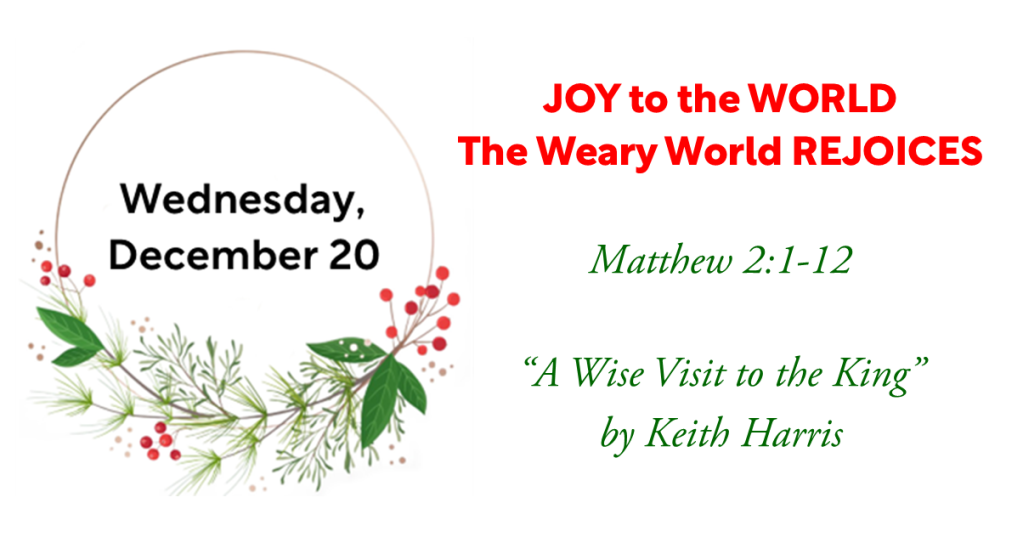
1 Now after Jesus was born in Bethlehem of Judea in the days of Herod the king, behold, wise men from the east came to Jerusalem, 2 saying, “Where is He who has been born king of the Jews? For we saw His star when it rose and have come to worship Him.” 3 When Herod the king heard this, he was troubled, and all Jerusalem with him; 4 and assembling all the chief priests and scribes of the people, he inquired of them where the Christ was to be born. 5 They told him, “In Bethlehem of Judea, for so it is written by the prophet:
Matthew 2:1-12
6 “’And you, O Bethlehem, in the land of Judah,
are by no means least among the rulers of Judah;
for from you shall come a ruler
who will shepherd my people Israel.’”
7 Then Herod summoned the wise men secretly and ascertained from them what time the star had appeared. 8 And he sent them to Bethlehem, saying, “Go and search diligently for the child, and when you have found Him, bring me word, that I too may come and worship Him.” 9 After listening to the king, they went on their way. And behold, the star that they had seen when it rose went before them until it came to rest over the place where the child was. 10 When they saw the star, the rejoiced exceedingly with great joy. 11 And going into the house, they saw the child with Mary His mother, and they fell down and worshiped Him. Then, opening their treasures, they offered Him gifts, gold and frankincense and myrrh. 12 And being warned in a dream not to return to Herod, they departed to their own country by another way.
“A Wise Visit to the King”
In the Gospel of Matthew, the account of the magi seeking the newborn King stands as a beacon of divine guidance amidst human intentions and deceit. The journey of the magi epitomizes the yearning within humanity for deeper significance and truth. Led by a celestial phenomenon—a guiding star—they embarked on a pilgrimage, seeking the birth of the prophesied King of the Jews. Yet, even within their noble quest, shadows of deceit loomed.
King Herod, masking his wicked intentions, manipulated the magi, seeking to exploit their mission for his own selfish gains. This contrast underscores the importance of discernment—a call relevant in our times, where authentic pursuit of truth can be clouded by deceptive motives and personal agendas. Herod’s malicious intent, masked by a false desire to worship, is revealed as he schemes to eliminate any perceived threat to his rule.
Bethlehem, the small town renowned as the birthplace of King David, becomes clear to be the prophesied site of the birth of the Messiah. Micah 5:2 is evoked as a direct prophecy fulfilled by Jesus’s birth in Bethlehem. This convergence of prophecy and reality underscores the divine orchestration of events, pointing towards Jesus’s role as the promised Messiah.
While the Magi seek to worship the newborn King, they present gifts—gold, frankincense, and myrrh—symbols that not only denote Jesus’s royalty and divinity but also foreshadow elements of His life, death, and purpose (Matthew 2:11). Gold, an emblem of kingship and divinity, prefigures Jesus’s royal lineage as the Son of God. Frankincense, used in sacred worship, symbolizes His sacrificial mission and holy nature. Myrrh, a substance associated with embalming and bitterness, prophetically hints at Jesus’s future suffering, death, and burial (Mark 15:23).
The unfolding narrative takes a darker turn as Herod, threatened by the mere existence of this prophesied King, devises a plan to murder Him. The holy family flees to Egypt, finding refuge there until Herod’s death. This flight mirrors the providential movements that underscore Jesus’s pivotal role in fulfilling divine prophecy and promises.
Fast-forwarding in Jesus’s life, His ministry leads to the events of His death, burial, and resurrection—the core elements that define Christian faith. The journey that began in Bethlehem culminates in Jerusalem, where Jesus willingly submits to the cross (Mark 15:22-24).
It ties to Jesus’s crucifixion—His ultimate act of love and sacrifice for humanity. His burial, marked by His descent from the cross and entombment, sets the stage for the awe-inspiring reality of His resurrection. In Jesus’s resurrection, the significance of Bethlehem intertwines with His ultimate victory over death, providing believers with hope, assurance, and salvation. His journey from Bethlehem to the cross, from crucifixion to resurrection, encapsulates the essence of God’s redemptive plan for humanity, inviting all to embrace the life-transforming truth of Christ’s sacrificial love and triumphant resurrection.
Reflection Questions:
- The gifts from the Magi – gold, frankincense, and myrrh – symbolically foreshadow various aspects of Jesus’s life, death, and purpose. How do these gifts deepen our understanding of Jesus’s identity and mission?
- How does Jesus’s sacrificial love and triumph over death offer believers hope and assurance in their lives?

"Adorned with the Word" from Colossians 3:15-17 (Refresh & Restore: Colossians — Jesus Over All) – Refresh & Restore | A JustKeithHarris.com Podcast
- "Adorned with the Word" from Colossians 3:15-17 (Refresh & Restore: Colossians — Jesus Over All)
- "Adorned with Thankfulness" from Colossians 3:15-17 (Refresh & Restore: Colossians — Jesus Over All)
- Advent 2023 — Christmas, December 25 | "The Light of the World is Here!"
- Advent 2023 — Christmas Eve, December 24 | "Good News of Great Joy, or The Weary World Rejoices"
- "A Tale of Two Saviors (Really, the One and Only)" from Luke 2:1-12 (Refresh & Restore)
1 Comment